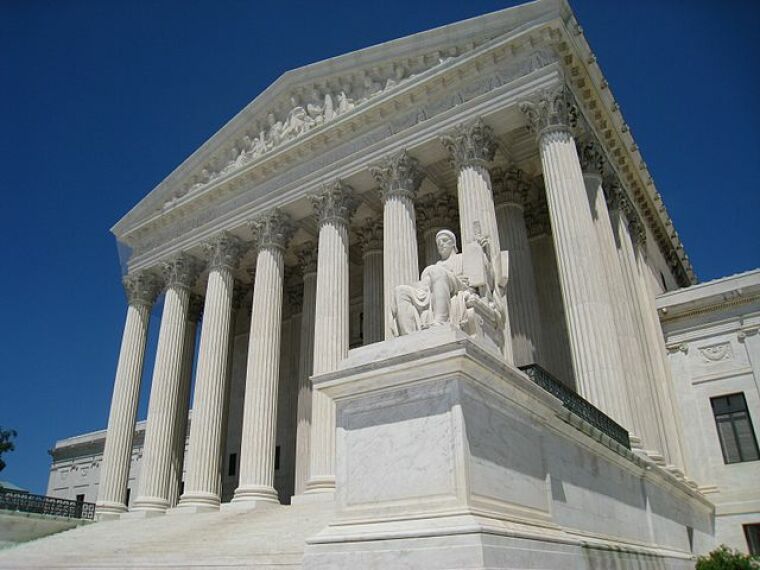Supreme Court rejects Westboro Baptist Church's challenge to Nebraska funeral protest law

The U.S. Supreme court has refused to consider an appeal filed by the Westboro Baptist Church, which is challenging a Nebraska law that prohibits picketing near funerals.
Westboro Baptist Church member Shirley Phelps-Roper filed a lawsuit questioning the constitutionality of the state law that prohibits protesters from coming within 500 feet of a cemetery, mortuary, church or other place of worship an hour before a funeral, and two hours after.
The 2006 law was passed in response to public outrage over the picketing of military funerals by members of the Topeka-based church, according to Omaha World-Herald.
Church members have been protesting military funerals across the country, claiming that the deaths of U.S. soldiers are God's retribution for the nation's tolerance of homosexuality.
Phelps-Roper had picketed the October 2011 funeral of 26-year-old Navy SEAL Caleb Nelson, holding signs that said "no peace for the wicked" and "thank God for dead soldiers."
The church filed the appeal with the high court in September after the Eighth U.S. Circuit Court of Appeals upheld the law in August, saying it balanced First Amendment rights and the rights of people who attend funerals.
In 2011, the U.S. Supreme Court upheld the rights of the church members to protest funerals because the protests were held on public property and they were speaking about matters of public concern. However, the ruling allowed the government to put restrictions on time, place and manner of protests, as long as the rules are narrowly written to serve a compelling government interest.
In 2016, a federal district court ruled in favor of Nebraska in the Phelps-Roper case, saying the law was content-neutral, tailored to fit a narrow use, and allowed for other means of protest for the church.
"The rights of all speakers, including Phelps-Roper and others at funerals, to publically express their beliefs are protected by the First Amendment—but are not absolute and some time, place, and/or manner restrictions are allowed," circuit judge Bobby Sheppard stated in the ruling.
The church's appeal to the high court was denied after it failed to get the support of four Justices needed to grant a hearing.
The state law initially barred picketing within 300 feet of a funeral, but the buffer zone was expanded to 500 feet in 2011.
State Sen. Bob Krist, who introduced the 2011 legislation, said he was not surprised by the high court's decision, noting that the law's backers did a lot of research to properly balance the rights of protesters and mourners.
"I know there are many families, including my own, who feel that their rights (should be) respected as well," he said.
 Christians don't have to affirm transgenderism, but they can’t express that view at work: tribunal
Christians don't have to affirm transgenderism, but they can’t express that view at work: tribunal Archaeology discovery: Medieval Christian prayer beads found on Holy Island
Archaeology discovery: Medieval Christian prayer beads found on Holy Island Presbyterian Church in America votes to leave National Association of Evangelicals
Presbyterian Church in America votes to leave National Association of Evangelicals Over 50 killed in 'vile and satanic' attack at Nigerian church on Pentecost Sunday
Over 50 killed in 'vile and satanic' attack at Nigerian church on Pentecost Sunday Ukrainian Orthodox Church severs ties with Moscow over Patriarch Kirill's support for Putin's war
Ukrainian Orthodox Church severs ties with Moscow over Patriarch Kirill's support for Putin's war Islamic State kills 20 Nigerian Christians as revenge for US airstrike
Islamic State kills 20 Nigerian Christians as revenge for US airstrike Man who served 33 years in prison for murder leads inmates to Christ
Man who served 33 years in prison for murder leads inmates to Christ


 Nigerian student beaten to death, body burned over ‘blasphemous’ WhatsApp message
Nigerian student beaten to death, body burned over ‘blasphemous’ WhatsApp message 'A new low': World reacts after Hong Kong arrests 90-year-old Cardinal Joseph Zen
'A new low': World reacts after Hong Kong arrests 90-year-old Cardinal Joseph Zen Iran sentences Christian man to 10 years in prison for hosting house church worship gathering
Iran sentences Christian man to 10 years in prison for hosting house church worship gathering French Guyana: Pastor shot dead, church set on fire after meeting delegation of Evangelicals
French Guyana: Pastor shot dead, church set on fire after meeting delegation of Evangelicals ‘Talking Jesus’ report finds only 6% of UK adults identify as practicing Christians
‘Talking Jesus’ report finds only 6% of UK adults identify as practicing Christians Mission Eurasia ministry center blown up in Ukraine, hundreds of Bibles destroyed: 'God will provide'
Mission Eurasia ministry center blown up in Ukraine, hundreds of Bibles destroyed: 'God will provide' Church holds service for first time after ISIS desecrated it 8 years ago
Church holds service for first time after ISIS desecrated it 8 years ago Burger King apologizes for 'offensive campaign' using Jesus' words at the Last Supper
Burger King apologizes for 'offensive campaign' using Jesus' words at the Last Supper Uganda: Muslims abduct teacher, burn him inside mosque for praying in Christ’s name
Uganda: Muslims abduct teacher, burn him inside mosque for praying in Christ’s name